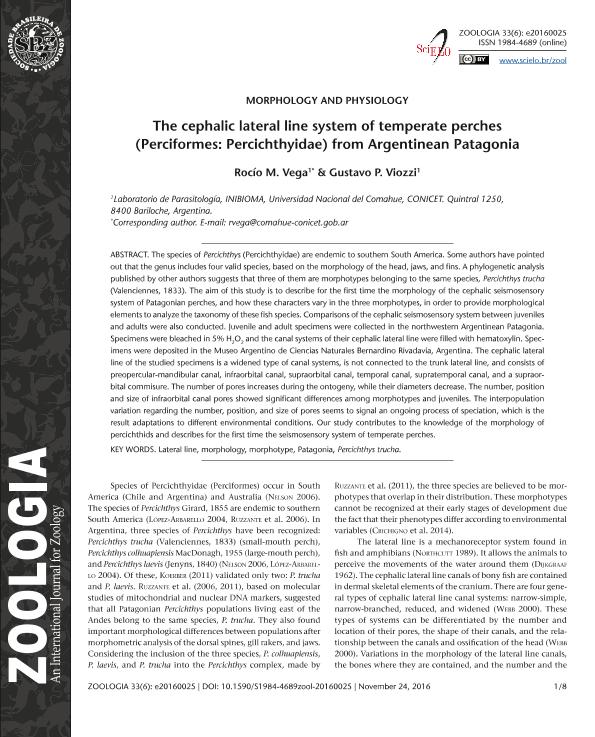Mostrar el registro sencillo del ítem
dc.contributor.author
Vega, Rocío Marisol

dc.contributor.author
Viozzi, Gustavo Pedro

dc.date.available
2019-02-07T17:21:51Z
dc.date.issued
2016-11
dc.identifier.citation
Vega, Rocío Marisol; Viozzi, Gustavo Pedro; The cephalic lateral line system of temperate perches (Perciformes: Percichthyidae) from Argentinean Patagonia; Sociedade Brasileira de Zoologia; Zoologia (Curitiba); 33; 6; 11-2016; 1-8
dc.identifier.issn
1984-4689
dc.identifier.uri
http://hdl.handle.net/11336/69641
dc.description.abstract
The species of Percichthys (Percichthyidae) are endemic to southern South America. Some authors have pointed out that the genus includes four valid species, based on the morphology of the head, jaws, and fins. A phylogenetic analysis published by other authors suggests that three of them are morphotypes belonging to the same species, Percichthys trucha (Valenciennes, 1833). The aim of this study is to describe for the first time the morphology of the cephalic seismosensory system of Patagonian perches, and how these characters vary in the three morphotypes, in order to provide morphological elements to analyze the taxonomy of these fish species. Comparisons of the cephalic seismosensory system between juveniles and adults were also conducted. Juvenile and adult specimens were collected in the northwestern Argentinean Patagonia. Specimens were bleached in 5% H2O2 and the canal systems of their cephalic lateral line were filled with hematoxylin. Specimens were deposited in the Museo Argentino de Ciencias Naturales Bernardino Rivadavia, Argentina. The cephalic lateral line of the studied specimens is a widened type of canal systems, is not connected to the trunk lateral line, and consists of preopercular-mandibular canal, infraorbital canal, supraorbital canal, temporal canal, supratemporal canal, and a supraorbital commisure. The number of pores increases during the ontogeny, while their diameters decrease. The number, position and size of infraorbital canal pores showed significant differences among morphotypes and juveniles. The interpopulation variation regarding the number, position, and size of pores seems to signal an ongoing process of speciation, which is the result adaptations to different environmental conditions. Our study contributes to the knowledge of the morphology of percichthids and describes for the first time the seismosensory system of temperate perches.
dc.format
application/pdf
dc.language.iso
eng
dc.publisher
Sociedade Brasileira de Zoologia

dc.rights
info:eu-repo/semantics/openAccess
dc.rights.uri
https://creativecommons.org/licenses/by-nc-sa/2.5/ar/
dc.subject
Lateral Line
dc.subject
Morphology
dc.subject
Morphotype
dc.subject
Patagonia
dc.subject
Percichthys Trucha
dc.subject.classification
Otras Ciencias Biológicas

dc.subject.classification
Ciencias Biológicas

dc.subject.classification
CIENCIAS NATURALES Y EXACTAS

dc.title
The cephalic lateral line system of temperate perches (Perciformes: Percichthyidae) from Argentinean Patagonia
dc.type
info:eu-repo/semantics/article
dc.type
info:ar-repo/semantics/artículo
dc.type
info:eu-repo/semantics/publishedVersion
dc.date.updated
2019-01-23T18:58:27Z
dc.journal.volume
33
dc.journal.number
6
dc.journal.pagination
1-8
dc.journal.pais
Brasil

dc.journal.ciudad
Curitiba
dc.description.fil
Fil: Vega, Rocío Marisol. Consejo Nacional de Investigaciones Científicas y Técnicas. Centro Científico Tecnológico Conicet - Patagonia Norte. Instituto de Investigaciones en Biodiversidad y Medioambiente. Universidad Nacional del Comahue. Centro Regional Universidad Bariloche. Instituto de Investigaciones en Biodiversidad y Medioambiente; Argentina
dc.description.fil
Fil: Viozzi, Gustavo Pedro. Consejo Nacional de Investigaciones Científicas y Técnicas. Centro Científico Tecnológico Conicet - Patagonia Norte. Instituto de Investigaciones en Biodiversidad y Medioambiente. Universidad Nacional del Comahue. Centro Regional Universidad Bariloche. Instituto de Investigaciones en Biodiversidad y Medioambiente; Argentina
dc.journal.title
Zoologia (Curitiba)

dc.relation.alternativeid
info:eu-repo/semantics/altIdentifier/doi/https://dx.doi.org/10.1590/S1984-4689zool-20160025
dc.relation.alternativeid
info:eu-repo/semantics/altIdentifier/url/http://ref.scielo.org/cjrpvw
Archivos asociados
